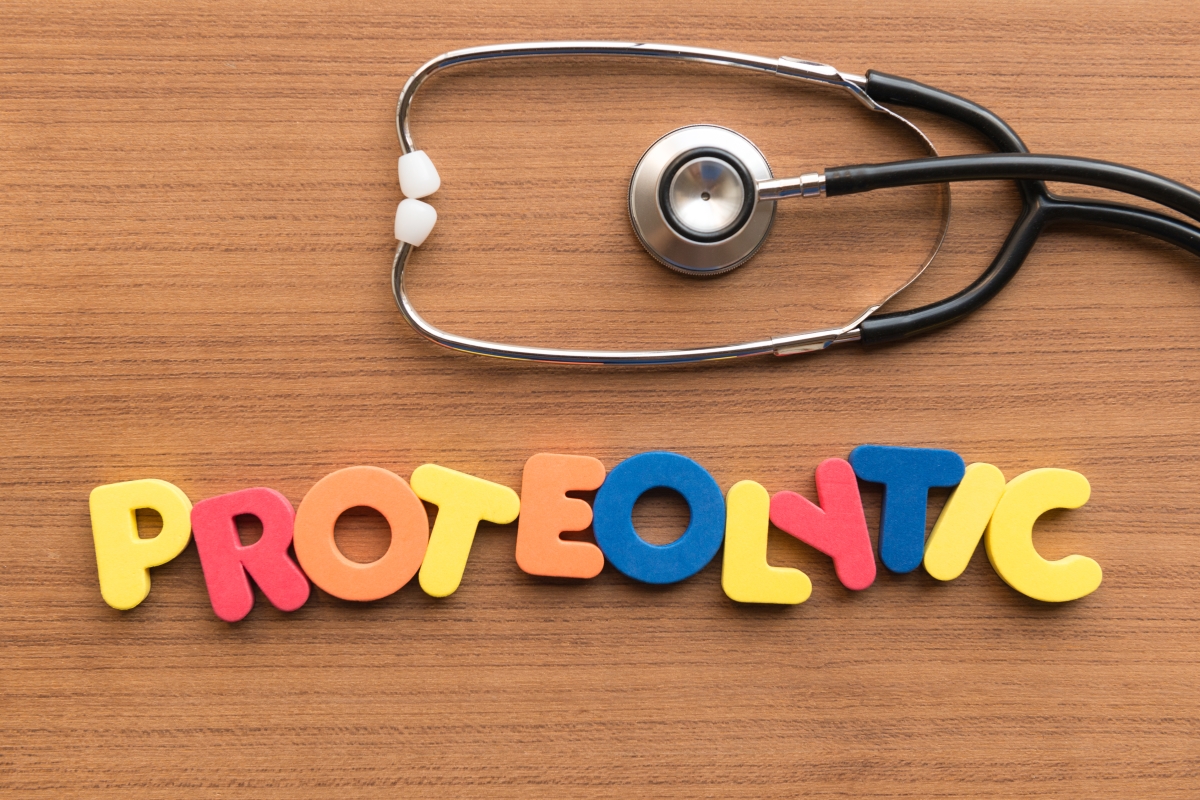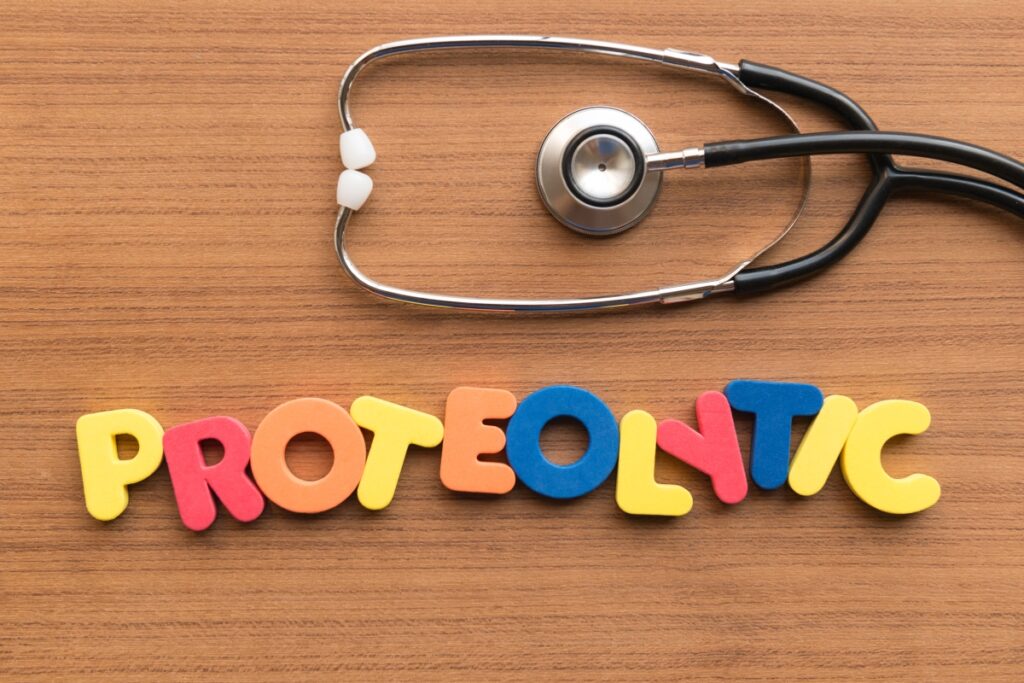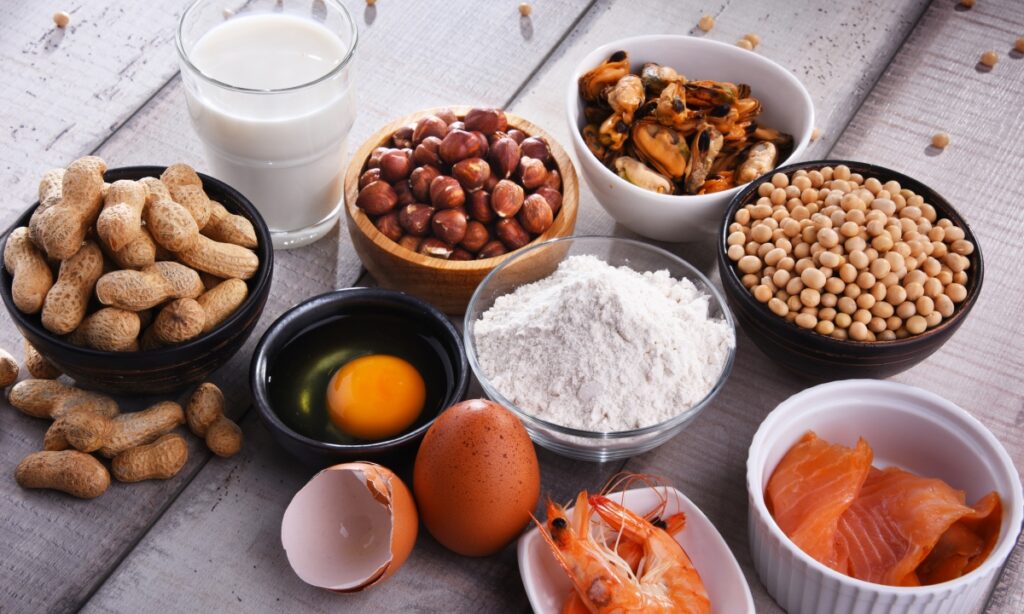
What Are Proteolytic Enzymes and What Do They Do?


What Are Proteolytic Enzymes and What Do They Do?

Digestive proteolytic enzymes
Your gut and pancreas produce and secrete digestive enzymes that digest fats, proteins, and carbohydrates into small units that your body can absorb and use.
Digestive proteolytic enzymes (proteases) in the human gut include pepsin, trypsin, and chymotrypsin.
Pepsin is the most important enzyme in protein digestion. It degrades proteins into peptides and amino acids. The chief cells in your stomach lining produce and release pepsinogen, the inactive form of pepsin. Once in the stomach, the hydrochloric acid in the digestive juice activates it into pepsin.
Trypsin is another enzyme that helps us digest protein in the small intestine. Trypsin is produced by the pancreas in its inactive form—trypsinogen. Once released into the small intestine, a protease called enterokinase converts it into trypsin, the active form
Chymotrypsin also works in the small intestine. Your pancreas produces chymotrypsinogen, chymotrypsin’s inactive form. Once released into the small intestine, trypsin activates it into chymotrypsin.
Now, we can learn about why proteolytic enzymes are important from the symptoms of low proteolytic enzymes. Then, we’ll cover the benefits of ensuring you have healthy levels of proteolytic enzymes and protein-digestion capacity.
What are the symptoms of low proteolytic enzymes?
Poor digestive function or low enzymes can cause bloating, digestive irregularity, and discomfort.
In addition, poor protein digestion can ripple effects throughout the body, such as amino acid deficiencies and incompletely digested proteins.
Symptoms of amino acid deficiencies
Most people in developed countries eat enough protein, so protein deficiency from low protein consumption is extremely rare.
However, because poor digestion has become more common, you may struggle with low amino acids, even if you’re eating enough proteins. The suboptimal or deficient amino acid levels tend to come from low protein-digesting capacity.
These symptoms may include:
- Inability to build and retain muscles
- Poor brain function and mental health issues since amino acids are the backbone of neurotransmitters.
- Reduced stress resilience, since stress hormones like adrenaline and noradrenaline, are made from amino acids.
- Poor detoxification, as some amino acids are important for detoxification
- Weak immune system
- Problems with hair, skin, and nails
Overall poor health
Incomplete protein digestion also leaves protein, peptides, or amino acids for the gut bacteria to ferment. This can breed unhealthy gut bacteria. Also, protein and amino acid fermentation tend to generate harmful metabolites that can be inflammatory, cancer-causing, or toxic to neurons.
These effects may explain why high meat consumption, especially red meat, is associated with increased all-cause mortality. It’s not the meat per se that’s the problem but the low protein digestive capacity that’s the problem.
Food allergies

Proteins and peptides have the potential to be allergens. To be allergenic, food allergens must survive or bypass digestion to provoke an allergic reaction. Therefore, poor protein digestion can contribute to food allergies.
Proteins are healthy foods, but you must ensure you digest and absorb them. This is even more important if you’re trying to build muscles on a high-protein diet because eating high proteins without ensuring you can digest them can be harmful.
Fortunately, you can support your protein digestion by supplementing with proteolytic enzymes, such as MassZymes, and probiotics, which produce proteolytic enzymes, such as L. plantarum in Probiotic Breakthrough.
Wade T. Lightheart, our cofounder, competed in bodybuilding at a high level on a plant-based diet with only 80 grams of protein a day. By using MassZymes, he tripled his body’s protein assimilation and won Mr. Universe against competitors who were eating over 200 grams of protein daily.
Once you optimize your protein digestion, you may reap the following health benefits.
Health benefits of proteolytic enzymes and optimal protein digestion

Improves muscle mass and retention
With aging often comes declining digestive capacity, which can lead to loss of muscle mass and nutrient deficiencies. The elderly often have reduced protein digestion and absorption.
Low protein assimilation often results in muscle wasting, impaired muscle growth, and muscle weakness. Therefore, consuming enough protein and healthy digestion is vital to prevent muscle wasting and maintain skeletal muscle mass and function.
Health problems are frequently associated with older age. Muscle mass loss and impaired muscle function are often seen in the elderly.
Age-related changes (sarcopenia) in muscle mass and function may result from:
- A caloric deficit due to reduced appetite
- Lack of physical activity
- Hormonal/growth factor levels
- Mitochondrial dysfunction
- Free radical/antioxidant activity
- Changed muscle protein turnover.
In a study comparing amino acid absorption after a high-protein meal between older and younger adults, the elderly digested and absorbed the protein slower than the younger adults.
Therefore, supplementing with digestive proteolytic enzymes may support muscle retention and well-being in the elderly.
Helps with muscle building at lower protein intake
Amino acids are important for muscle building and retention. Low protein intake or poor protein digestion can reduce muscle mass or retention.
Muscle building takes a lot of calories. And once you build muscle mass, it slightly increases your metabolism. Therefore, improving your amino acid assimilation into your muscle can support your fat loss effort.
Supporting neurotransmitter and hormone balance
The nervous system requires amino acids to produce neurotransmitters.
Serotonin is a neurotransmitter responsible for a happy mood. The amino acid tryptophan provides a backbone for serotonin. Reduced tryptophan levels contribute to mental health issues and aggression, whereas increased tryptophan levels induce drowsiness and the ability to feel discomfort.
The amino acids tyrosine and phenylalanine provide backbones for hormones and neurotransmitters such as dopamine, epinephrine, norepinephrine, and thyroid hormones. Whereas glycine and glutamate can work as neurotransmitters. Glycine also provides a backbone for GABA.
How to increase your proteolytic enzymes and overall protein-digesting capacity

Eat foods that are high in enzymes.
Papayas and pineapples are great sources of plant-based proteolytic enzymes.
- Papain is a protease derived from papaya plant latex.
- Bromelain is a strong proteolytic enzyme found in pineapples.
- Ficin is an enzyme extract derived from the latex of the fig tree.
Other sources of proteolytic enzymes include:
- Kiwifruit
- Asparagus
- Ginger
- Fermented foods (kefir, kombucha, sauerkraut, tempeh, natto, miso, kimchi, and sourdough bread).
Fermented foods are produced by the action of microorganisms and their enzymes in a process known as fermentation.
Fermentation produces metabolites such as vitamins and enzymes while reducing anti-nutrients. Also, milk, cereals, fruits and vegetables, meat, and fish have higher antioxidant activity after fermentation.
Take digestive bitters
Bitters, or bitter herbs, have the ability to enhance digestive activity.
Gentian (Gentiana lutea L.) and wormwood (Artemisia absinthium L.) stimulate the gustatory nerves in the mouth to produce more gastric juice and bile.
Other herbs that have digestion-enhancing activities include :
- Ginger
- Peppermint
- Aniseed
- Fennel
- Citrus fruits
- Dandelion
- Artichoke
- Melissa
- Chamomile
Supplementing with proteolytic enzymes and proteolytic probiotics
Proteolytic enzyme supplements are a great way to ensure healthy protein digestion. MassZymes is our plant-based full-spectrum digestive enzyme with the highest concentration of proteolytic enzymes on the market.
Probiotic Breakthrough is a powerful probiotic strain that produces proteolytic enzymes.
References
- Mótyán JA, Tóth F, Tőzsér J. Research applications of proteolytic enzymes in molecular biology. Biomolecules. 2013;3(4):923-942.
- García-Carreño FL. Proteinase inhibitors. Trends Food Sci Technol. 1996;7(6):197-204.
- Ianiro G, Pecere S, Giorgio V, Gasbarrini A, Cammarota G. Digestive enzyme supplementation in gastrointestinal diseases. Curr Drug Metab. 2016;17(2):187-193.
- Fu Z, Akula S, Thorpe M, Hellman L. Marked difference in efficiency of the digestive enzymes pepsin, trypsin, chymotrypsin, and pancreatic elastase to cleave tightly folded proteins. Biol Chem. 2021;402(7):861-867.
- Heda R, Toro F, Tombazzi CR. Physiology, Pepsin. In: StatPearls. StatPearls Publishing; 2021.
- Simpson RJ. Fragmentation of protein using trypsin. CSH Protoc. 2006;2006(5):db.prot4550-pdb.prot4550.
- Hirota M, Ohmuraya M, Baba H. The role of trypsin, trypsin inhibitor, and trypsin receptor in the onset and aggravation of pancreatitis. J Gastroenterol. 2006;41(9):832-836.
- Kitamoto Y, Yuan X, Wu Q, McCourt DW, Sadler JE. Enterokinase, the initiator of intestinal digestion, is a mosaic protease composed of a distinctive assortment of domains. Proc Natl Acad Sci U S A. 1994;91(16):7588-7592.
- Chymotrypsin – MeSH – NCBI. Nih.gov. Accessed October 19, 2021. https://www.ncbi.nlm.nih.gov/mesh?Db=mesh&Cmd=DetailsSearch&Term=%22Chymotrypsin%22%5BMeSH+Terms%5D
- Appel W. Chymotrypsin: molecular and catalytic properties. Clin Biochem. 1986;19(6):317-322.
- Quinten T, Philippart J-M, De Beer T, Vervarcke S, Van Den Driessche M. Can the supplementation of a digestive enzyme complex offer a solution for common digestive problems? Arch Public Health. 2014;72(S1):P7.
- Protein Deficiency – MeSH – NCBI. Nih.gov. Accessed October 19, 2021. https://www.ncbi.nlm.nih.gov/mesh?Db=mesh&Cmd=DetailsSearch&Term=%22Protein+Deficiency%22%5BMeSH+Terms%5D
- Dehhaghi M, Kazemi Shariat Panahi H, Guillemin GJ. Microorganisms, tryptophan metabolism, and kynurenine pathway: A complex interconnected loop influencing human health status. Int J Tryptophan Res. 2019;12:1178646919852996.
- Zeraatkar D, Han MA, Guyatt GH, et al. Red and processed meat consumption and risk for all-cause mortality and cardiometabolic outcomes: A systematic review and meta-analysis of cohort studies: A systematic review and meta-analysis of cohort studies. Ann Intern Med. 2019;171(10):703-710.
- Zhong VW, Van Horn L, Greenland P, et al. Associations of processed meat, unprocessed red meat, poultry, or fish intake with incident cardiovascular disease and all-cause mortality. JAMA Intern Med. 2020;180(4):503-512.
- Untersmayr E. The influence of gastric digestion on the development of food allergy. Rev Fr Allergol (2009). 2015;55(7):444-447.
- Masilamani M, Commins S, Shreffler W. Determinants of food allergy. Immunol Allergy Clin North Am. 2012;32(1):11-33.
- Khalid NM, Marth EH. Proteolytic Activity by Strains of Lactobacillus plantarum and Lactobacillus casei. J Dairy Sci. 1990;73(11):3068-3076.
- Milan AM, D’Souza RF, Pundir S, et al. Older adults have delayed amino acid absorption after a high protein mixed breakfast meal. J Nutr Health Aging. 2015;19(8):839-845.
- Deer RR, Volpi E. Protein intake and muscle function in older adults. Curr Opin Clin Nutr Metab Care. 2015;18(3):248-253.
- Mantle D, Preedy VR. Adverse and beneficial functions of proteolytic enzymes in skeletal muscle. An overview. Adverse Drug React Toxicol Rev. 2002;21(1-2):31-49.
- Tipton KD, Hamilton DL, Gallagher IJ. Assessing the role of muscle protein breakdown in response to nutrition and exercise in humans. Sports Med. 2018;48(S1):53-64.
- Institute of Medicine (US) Committee on Military Nutrition Research. Amino Acid and Protein Requirements: Cognitive Performance, Stress, and Brain Function. National Academies Press; 1999.
- Fernstrom JD, Fernstrom MH. Tyrosine, phenylalanine, and catecholamine synthesis and function in the brain. J Nutr. 2007;137(6 Suppl 1):1539S-1547S; discussion 1548S.
- Fitsanakis VA, Aschner M. The importance of glutamate, glycine, and gamma-aminobutyric acid transport and regulation in manganese, mercury and lead neurotoxicity. Toxicol Appl Pharmacol. 2005;204(3):343-354.
- Bekhit AA, Hopkins DL, Geesink G, Bekhit AA, Franks P. Exogenous proteases for meat tenderization. Crit Rev Food Sci Nutr. 2014;54(8):1012-1031.
- Morellon-Sterling R, El-Siar H, Tavano OL, Berenguer-Murcia Á, Fernández-Lafuente R. Ficin: A protease extract with relevance in biotechnology and biocatalysis. Int J Biol Macromol. 2020;162:394-404.
- Ha M, Bekhit AE-D, Carne A, Hopkins DL. Characterisation of kiwifruit and asparagus enzyme extracts, and their activities toward meat proteins. Food Chem. 2013;136(2):989-998.
- Huang XW, Chen LJ, Luo YB, Guo HY, Ren FZ. Purification, characterization, and milk coagulating properties of ginger proteases [published correction appears in J Dairy Sci. 2011 Aug;94(8):4242]. J Dairy Sci. 2011;94(5):2259-2269. https://pubmed.ncbi.nlm.nih.gov/21524515/
- Dimidi E, Cox SR, Rossi M, Whelan K. Fermented foods: Definitions and characteristics, impact on the gut Microbiota and effects on gastrointestinal health and disease. Nutrients. 2019;11(8):1806.
- Melini F, Melini V, Luziatelli F, Ficca AG, Ruzzi M. Health-promoting components in fermented foods: An up-to-date systematic review. Nutrients. 2019;11(5):1189.
- Şanlier N, Gökcen BB, Sezgin AC. Health benefits of fermented foods. Crit Rev Food Sci Nutr. 2019;59(3):506-527.
- McMullen MK, Whitehouse JM, Towell A. Bitters: Time for a new paradigm. Evid Based Complement Alternat Med. 2015;2015:670504.
- Valussi M. Functional foods with digestion-enhancing properties. Int J Food Sci Nutr. 2012;63 Suppl 1(sup1):82-89.
